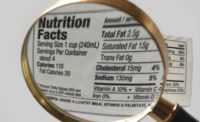Poll: Plant-based beverage processors should refrain from using “milk” on product labels
Most Americans believe that the U.S. Food & Drug Administration should restrict plant-based beverage companies from using the word “milk” on product labels.

Half of all Americans (49%) believe that non-dairy brands should not be allowed to use the term “milk” on their product labels because they are often less nutritious than dairy milk, according to a poll conducted on behalf of the National Milk Producers Federation, Arlington, Va. However, half of Americans (47%) also believe that allowing companies to use the word “milk” on non-dairy beverages, despite a policy that restricts imitation dairy foods derived from plants from being labeled as a type of milk, has no effect on their confidence in food labeling.
A little less than half said it made them less confident in U.S. food labeling, while a small minority said it made them more confident. When informed that the U.S. Food and Drug Administration currently defines “milk” as the product of an animal, but doesn’t enforce the labeling rule, most respondents (61%) said they believe the FDA should restrict non-dairy beverage companies from using the term “milk.” A smaller number (23%) believe that the FDA should not restrict non-dairy beverage companies.
About the study
The findings stem from a poll conducted by Ipsos, France, on Jan. 4-7, on behalf of the National Milk Producers Federation. For the survey, a sample of 1,005 adults 18 and over from the continental United States, Alaska and Hawaii were interviewed online in English.
The sample for this study was randomly drawn from Ipsos’ online panel, partner online panel sources, and “river” sampling, and does not rely on a population frame in the traditional sense. Ipsos uses fixed sample targets, unique to each study, in drawing a sample. After a sample is obtained from the Ipsos panel, Ipsos calibrates respondent characteristics to be representative of the U.S. population using standard procedures such as raking-ratio adjustments. The source of these population targets is U.S. Census 2016 American Community Survey data. The sample drawn for this study reflects fixed sample targets on demographics. Post-hoc weights were made to the population characteristics on gender, age, race/ethnicity, region and education. Statistical margins of error are not applicable to online polls. All sample surveys and polls may be subject to other sources of error, including but not limited to coverage error and measurement error. Where figures do not sum to 100, this is due to the effects of
rounding. The precision of Ipsos online polls is measured using a credibility interval. In this case, the poll has a credibility interval of +/- 3.5 percentage points for all respondents. Ipsos calculates a design effect (DEFF) for each study based on the variation of the weights, following the formula of Kish (1965).
Looking for a reprint of this article?
From high-res PDFs to custom plaques, order your copy today!





